It is mostly observed in every 20 children and if not treated, it might be a life-long problem. Since the children cannot utter their complaints, it is diagnosed during the clinical examinations. It also might be inherited from the medical history of the family, so it is recommended to make early examinations for those whose parents have the history of Lazy Eye Syndrome. Starting the treatment before the ages 3-4 is very important.
Lazy eye, also known as Amblyopia, is a condition that usually occurs in one eye. In the lazy eye, the visual cortex part of the brain and eye connection is failed and the brain can not recognize sight from one eye. In time, as one eye gets stronger and the other gets weaker. Amblyopia is the lazy eye that is caused by abnormal visual development is usually seen between birth and seven years old. It causes discreet vision in childhood. Early diagnosis is very important for lazy eye and treatment at this stage can prevent the patient from long-term results. Glasses, contact lenses, and patching therapy can be helpful to correct the lazy eye.
In this article, we will mention the causes of lazy eye and symptoms of lazy eye in the first part. In the second part, you can read about what lazy eye treatment is and the types of lazy eye treatments.
A lazy eye or amblyopia is a vision impairment that occurs as a result of abnormal vision development that changes the pathway of the nerves between retain and the brain. About one-half to two-thirds of amblyopia cases also have anisometropia either alone or in combination with strabismus, eye misalignment. The ability of the eyes to work together decreases and one eye gets weaker as the brain can not get a connection with it properly.
Some of the causes of lazy eye and amblyopia can be lined up as below:
A lazy eye may not have symptoms and can be diagnosed in an eye test by an eye doctor. The most common symptoms of a lazy eye can be lined up as below:
You may have a lazy eye. If you doubt having a lazy eye, you should visit a medical expert at a hospital or a medical center as soon as possible. Early diagnosis is very important for lazy eyes.
All treatments for lazy eyes focus on improving the weaker eye and eye obstruction by using different methods.
Many children don’t realize any symptoms of a lazy eye. The reason for that is the visual process. It is done by the stronger eye as the weaker eye gets weaker till the eye doctor diagnosed a lazy eye. The treatment of lazy eye is more effective in early childhood. After 8 years old, the likelihood of vision improvement drops but treatment still can be effective after that age too.
Your child's vision will show signs of improvement within a few weeks of starting treatment. However, keep in mind that it may take months to get the best results. These treatments may be needed from time to time to prevent amblyopia from coming back. If you like to find out more about lazy eye treatment in the ophthalmology clinic and visit our pediatric ophthalmologists at Ekol International Hospitals, please contact our patient help service staff today.
Some of the lazy eye treatments are including:
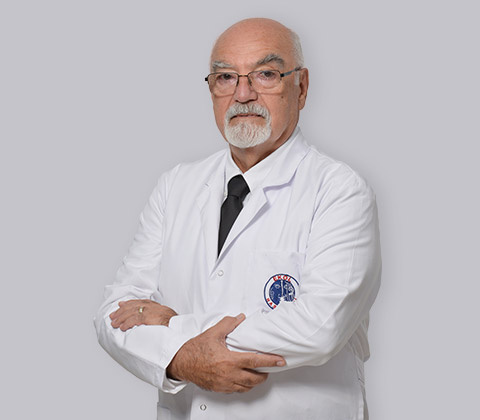 He was born in Ankara in 1945. He attended TED Ankara College, İzmir Bornova Anatolian High School and Ege University, Faculty of Medicine between 1963 and 1969, respectively. Upon his graduation, he started his specialization at Ege University, Faculty of Medicine, Eye Diseases Department and assumed the title of Eye Diseases Specialist in 1971. Between 1974 and 1975, he performed his military service as an ophthalmologist in Hatay Military Hospital in İzmir. After that, he was educated on Retinal Diseases and Lasers in Ophthalmology Clinic of the Faculty of Medicine at University of Gant, Belgium for 1 year. In 1977, he assumed the title of Associate Professor of Ophthalmology, and he founded and operated Retina and Contact Lenses units in Ege University, Faculty of Medicine, Department of Eye Diseases. In 1982 he became a Professor of Eye Diseases. Between 1992 and 2000, he served as the Head of Department of Eye Diseases, Faculty of Medicine, Ege University. In the meantime, he published 3 books and more than 150 domestic and foreign scientific papers, and about 170 papers in national and international congresses. He is married to Dr. Nigar Erbakan and has two sons.
He was born in Ankara in 1945. He attended TED Ankara College, İzmir Bornova Anatolian High School and Ege University, Faculty of Medicine between 1963 and 1969, respectively. Upon his graduation, he started his specialization at Ege University, Faculty of Medicine, Eye Diseases Department and assumed the title of Eye Diseases Specialist in 1971. Between 1974 and 1975, he performed his military service as an ophthalmologist in Hatay Military Hospital in İzmir. After that, he was educated on Retinal Diseases and Lasers in Ophthalmology Clinic of the Faculty of Medicine at University of Gant, Belgium for 1 year. In 1977, he assumed the title of Associate Professor of Ophthalmology, and he founded and operated Retina and Contact Lenses units in Ege University, Faculty of Medicine, Department of Eye Diseases. In 1982 he became a Professor of Eye Diseases. Between 1992 and 2000, he served as the Head of Department of Eye Diseases, Faculty of Medicine, Ege University. In the meantime, he published 3 books and more than 150 domestic and foreign scientific papers, and about 170 papers in national and international congresses. He is married to Dr. Nigar Erbakan and has two sons.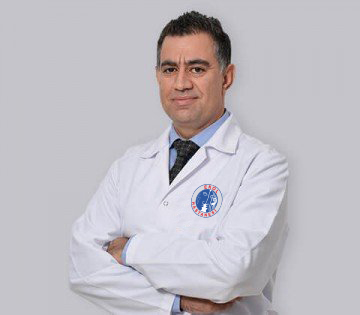 Dr Esat Çınar was born in Diyarbakır in 1976. He started İstanbul University, Faculty of Medicine in 1997 and graduated in 2003. He completed his speciality degree between 2003 and 2009 at İzmir Ege University, Faculty of Medicine, Ophthalmology Department. He was in charge of Glaucoma and Cornea Departments as a Deputy Associate Professor in İzmir University Hospital Faculty of Medicine, Department of Ophthalmology. He studied “Keratoplasty” in Ege University, Faculty of Medicine for 6 months (also known as “eye transplant”). He also was in charge of the controls of the premature babies’ in İzmir University Ophthalmology Department. He attended the course for vivisection both in clinical and laboratory fields for one month. His special interests are; Cataract surgery (multifocal, trifocal and thoric intraocular lenses), Cataract surgery with laser (Femtosecond Cataract), Keratoplasty, glaucoma surgery (non-penetrant surgeries such as viscocanalostomy, deep sclerotomy), Excimer Laser Surgeries (Lasik, Lasek, PRK), medical retinal diseases. He has many published articles in international indexes. He has many verbal and written presentations in national and international scientific meetings. He is an active member of the Turkish Association for Ophthalmology. He speaks fluent English and has one child.
Dr Esat Çınar was born in Diyarbakır in 1976. He started İstanbul University, Faculty of Medicine in 1997 and graduated in 2003. He completed his speciality degree between 2003 and 2009 at İzmir Ege University, Faculty of Medicine, Ophthalmology Department. He was in charge of Glaucoma and Cornea Departments as a Deputy Associate Professor in İzmir University Hospital Faculty of Medicine, Department of Ophthalmology. He studied “Keratoplasty” in Ege University, Faculty of Medicine for 6 months (also known as “eye transplant”). He also was in charge of the controls of the premature babies’ in İzmir University Ophthalmology Department. He attended the course for vivisection both in clinical and laboratory fields for one month. His special interests are; Cataract surgery (multifocal, trifocal and thoric intraocular lenses), Cataract surgery with laser (Femtosecond Cataract), Keratoplasty, glaucoma surgery (non-penetrant surgeries such as viscocanalostomy, deep sclerotomy), Excimer Laser Surgeries (Lasik, Lasek, PRK), medical retinal diseases. He has many published articles in international indexes. He has many verbal and written presentations in national and international scientific meetings. He is an active member of the Turkish Association for Ophthalmology. He speaks fluent English and has one child.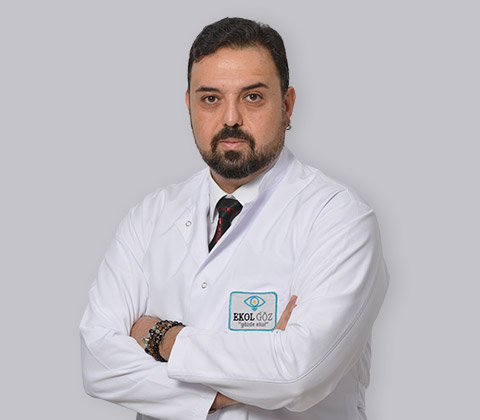 He was born in Izmir, in 1971. He attended summer school at Mids School of English, Eastbourn, England for learning a foreign language while he was in Bornova Anatolian High School and graduated with a high degree. He started his medical education at Ege University and continued with his specialization at JL Uni-Giessen, Germany, where he had the chance of working peer to peer with names such as Prof. Dr. Karl W. Jacobi, Prof Dr. Herbert Kaufmann, Prof. Dr. S. Pavlovic. Then, he found the opportunity to further his education in the field of refractive surgery by working with the most important names, such as Prof. Dr. T. Kohnen, JWG Uni-Frankfurt, Prof. Dr. I. Pallikaris, University of Crete, Prof Dr. Mahmut Kaşkaloğlu, Ege University Faculty of Medicine and Kaşkaloğlu Eye Hospital. Besides, he did scientific studies about medical glaucoma treatment, which is his other field of interest, with Ass. Prof. Dr. Karl Georg Schmidt, CGC Uni-Dresden. He is a member of DOG, ESCRS, ISRS of the AAO and TOD. He is married and has one child.
He was born in Izmir, in 1971. He attended summer school at Mids School of English, Eastbourn, England for learning a foreign language while he was in Bornova Anatolian High School and graduated with a high degree. He started his medical education at Ege University and continued with his specialization at JL Uni-Giessen, Germany, where he had the chance of working peer to peer with names such as Prof. Dr. Karl W. Jacobi, Prof Dr. Herbert Kaufmann, Prof. Dr. S. Pavlovic. Then, he found the opportunity to further his education in the field of refractive surgery by working with the most important names, such as Prof. Dr. T. Kohnen, JWG Uni-Frankfurt, Prof. Dr. I. Pallikaris, University of Crete, Prof Dr. Mahmut Kaşkaloğlu, Ege University Faculty of Medicine and Kaşkaloğlu Eye Hospital. Besides, he did scientific studies about medical glaucoma treatment, which is his other field of interest, with Ass. Prof. Dr. Karl Georg Schmidt, CGC Uni-Dresden. He is a member of DOG, ESCRS, ISRS of the AAO and TOD. He is married and has one child.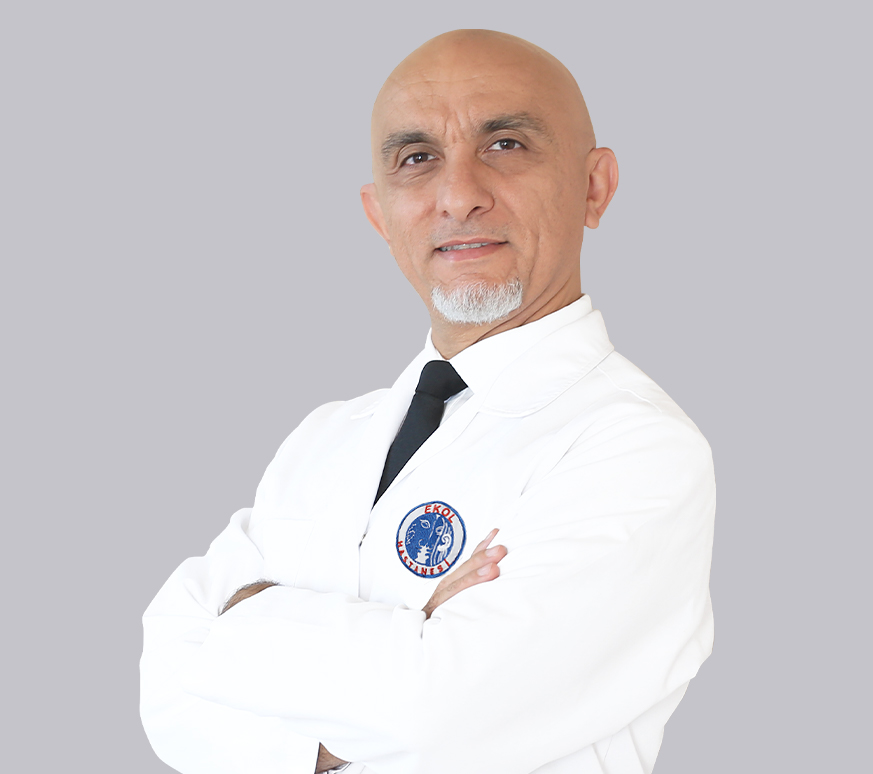 He graduated from Hacettepe University Faculty of Medicine in 1998. He completed his speciality in İzmir Dokuz Eylül University Faculty of Medicine Department of Eye Diseases between 1998 and 2002. He studied Retinal Surgeries in Munich Ludwig – Maximillian University Faculty of Medicine, Department of Eye Diseases. Special Interests: Cataract Surgeries (Multifocal, Trifocal, Toric Intraocular Lenses), Laser Cataract Surgeries (Femtosecond, Laser Cataract), Excimer Laser Surgeries (Lasik, Lasek, PRK) and Medical & Surgical Retinal Surgeries, Eyelid Surgeries. He has many articles published which were also scientifically indexed. He has oral and poster presentations in national & international science meetings. He is an active member of Turkish Society of Ophthalmology. He speaks English & German well, and married with 2 children.
He graduated from Hacettepe University Faculty of Medicine in 1998. He completed his speciality in İzmir Dokuz Eylül University Faculty of Medicine Department of Eye Diseases between 1998 and 2002. He studied Retinal Surgeries in Munich Ludwig – Maximillian University Faculty of Medicine, Department of Eye Diseases. Special Interests: Cataract Surgeries (Multifocal, Trifocal, Toric Intraocular Lenses), Laser Cataract Surgeries (Femtosecond, Laser Cataract), Excimer Laser Surgeries (Lasik, Lasek, PRK) and Medical & Surgical Retinal Surgeries, Eyelid Surgeries. He has many articles published which were also scientifically indexed. He has oral and poster presentations in national & international science meetings. He is an active member of Turkish Society of Ophthalmology. He speaks English & German well, and married with 2 children.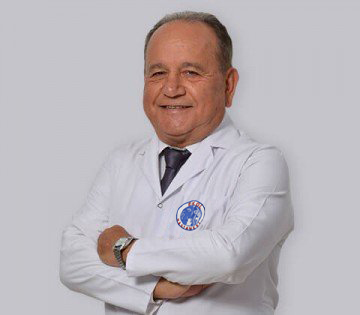 He graduated from Istanbul University, Faculty of Medicine and completed his specialty training in S.S.K Istanbul Hospital in 1984. He worked at Çanakkale State Hospital between 1984 and 2007. After 2007, he worked in private sector health units. He is an active member of The Turkish Ophthalmology Association and American Cataract and Refractive Association. Anterior segment (cataract) medical retina, glaucoma and contact lens are his areas of interest. He has a good command of English.
He graduated from Istanbul University, Faculty of Medicine and completed his specialty training in S.S.K Istanbul Hospital in 1984. He worked at Çanakkale State Hospital between 1984 and 2007. After 2007, he worked in private sector health units. He is an active member of The Turkish Ophthalmology Association and American Cataract and Refractive Association. Anterior segment (cataract) medical retina, glaucoma and contact lens are his areas of interest. He has a good command of English.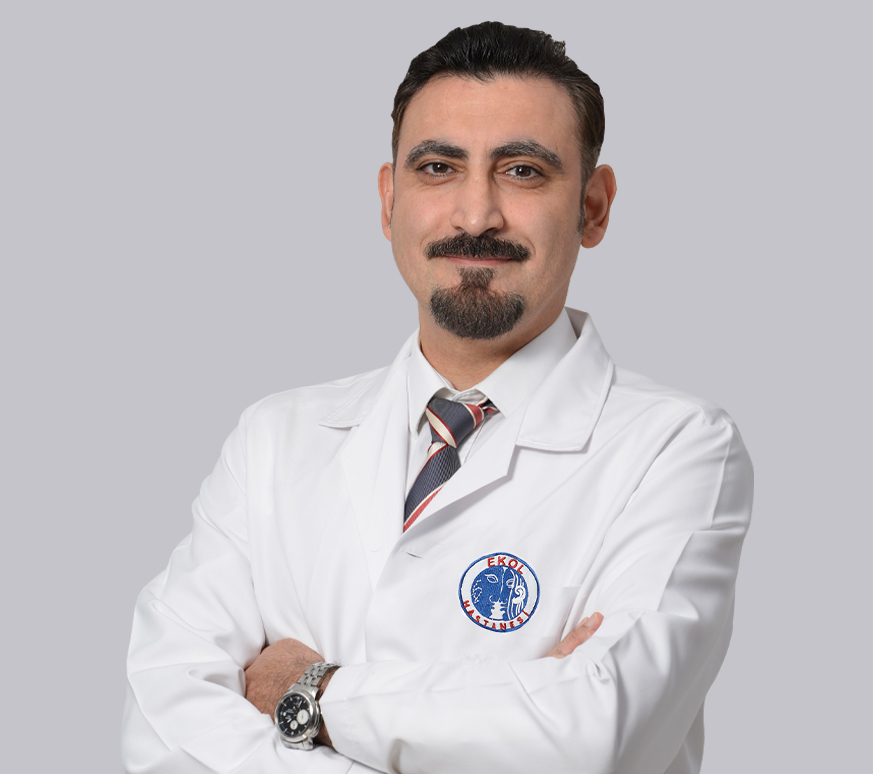 He was born in 1977. He graduated from Ege University. Fields of Interest: Cataract Surgery (Monofocal, Multifocal, Trifocal, EDOF, Toric Lenses) Excimer Laser (Femtosecond LASIK, PRK, No-Touch) ICL Keratoconus - Crosslink, Hard Contact Lens Application, Intrastromal Corneal Ring Strabismus Surgery Oculoplastic Surgery (Eyelid Aesthetic Surgery, Ectropium, Entropium, Ptosis, Probing, Tear Duct Obstruction) Pterygium Surgery (with Autograft) Glaucoma Medical and Laser Therapy Retinal Diseases (Intraocular Drug Injections, Diabetic Retinopathy, Yellow Spot Disease, Retinal Tears) Soft Contact Lens Inspection and Application He is a member of Turkish Association of Ophthalmology. He is married.
He was born in 1977. He graduated from Ege University. Fields of Interest: Cataract Surgery (Monofocal, Multifocal, Trifocal, EDOF, Toric Lenses) Excimer Laser (Femtosecond LASIK, PRK, No-Touch) ICL Keratoconus - Crosslink, Hard Contact Lens Application, Intrastromal Corneal Ring Strabismus Surgery Oculoplastic Surgery (Eyelid Aesthetic Surgery, Ectropium, Entropium, Ptosis, Probing, Tear Duct Obstruction) Pterygium Surgery (with Autograft) Glaucoma Medical and Laser Therapy Retinal Diseases (Intraocular Drug Injections, Diabetic Retinopathy, Yellow Spot Disease, Retinal Tears) Soft Contact Lens Inspection and Application He is a member of Turkish Association of Ophthalmology. He is married.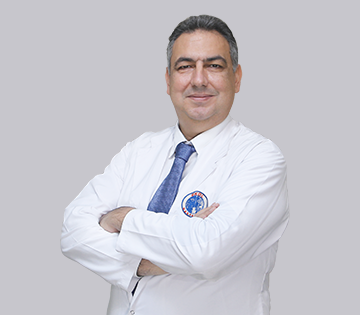 Dr. Kaan Okan Erdem was born in İzmir, in 1968. He finished middle school in Private İzmir Türk College and high school in Atatürk High School. He studied medicine in Selçuk University Faculty of Medicine. He is an active member of European Association of Cataract and Refractive Surgery, European Association of Ophthalmic Plastic and Reconstructive Surgery. He is interested in cataract, refractive surgery, oculoplastic and reconstructive surgery (upper and lower eyelids, tumour removals around the eye, entropium, ectropium ptosis, blepharoplasty), eye ultrasound, medical retinal and glaucoma. He speaks fluent English and married with 2 children.
Dr. Kaan Okan Erdem was born in İzmir, in 1968. He finished middle school in Private İzmir Türk College and high school in Atatürk High School. He studied medicine in Selçuk University Faculty of Medicine. He is an active member of European Association of Cataract and Refractive Surgery, European Association of Ophthalmic Plastic and Reconstructive Surgery. He is interested in cataract, refractive surgery, oculoplastic and reconstructive surgery (upper and lower eyelids, tumour removals around the eye, entropium, ectropium ptosis, blepharoplasty), eye ultrasound, medical retinal and glaucoma. He speaks fluent English and married with 2 children.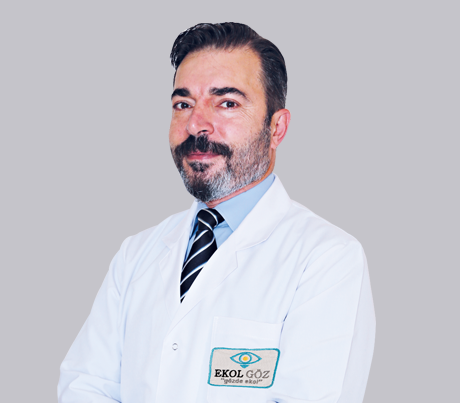 He graduated from Dokuz September University Faculty of Medicine in 1996. He completed his specialized education in the Department of Ophthalmology of the Faculty of Medicine of the Aegean University between 1996-2001 and earned the title of ophthalmologist Dec.
He has published numerous scientific articles that fall into international scientific indexes. There are numerous oral and poster presentations to national and international scientific meetings. He is an active member of the Turkish Ophthalmology Association (Tod).
He speaks good English, Opr. Dr. Uğur Karagöz is the father of 2 children.
Special interests:
Cataract surgery (multifocal, trifocal, Toric intraocular lenses)
Cataract surgery with laser (Femtosecond Laser Cataract)
Excimer laser surgeries (Lasik, Lasek, PRK)
Medical and surgical Retina
Eyelid Surgeries
He graduated from Dokuz September University Faculty of Medicine in 1996. He completed his specialized education in the Department of Ophthalmology of the Faculty of Medicine of the Aegean University between 1996-2001 and earned the title of ophthalmologist Dec.
He has published numerous scientific articles that fall into international scientific indexes. There are numerous oral and poster presentations to national and international scientific meetings. He is an active member of the Turkish Ophthalmology Association (Tod).
He speaks good English, Opr. Dr. Uğur Karagöz is the father of 2 children.
Special interests:
Cataract surgery (multifocal, trifocal, Toric intraocular lenses)
Cataract surgery with laser (Femtosecond Laser Cataract)
Excimer laser surgeries (Lasik, Lasek, PRK)
Medical and surgical Retina
Eyelid Surgeries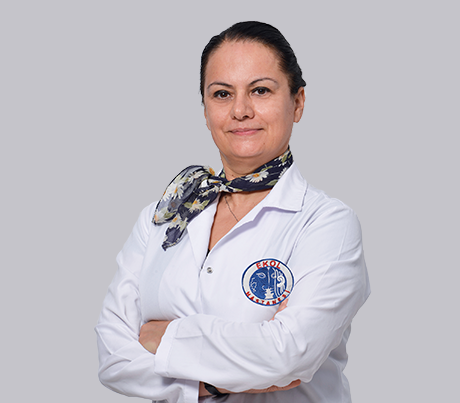 Born in Cyprus Serdarlı, he graduated from Nicosia Turkish High School. He graduated from Dokuz Eylul University Faculty of Medicine.
He completed his specialization in Atatürk Health Site Yeşilyurt State Hospital with his thesis on the comparison of the rear camera lens application and the front camera lenses, which was started to be applied for the first time in the clinic under the management of Zühal Çakırca, the clinical chief. She worked as a contact lens center in İzmir for three years and then as chief physician at Karşıyaka Kızılay Fatma Kutluay Dispensary.
He continued to work in Karşıyaka by establishing the Private Yalı Polyclinic in 2005 and the Private Yalı Eye Health Branch Center in 2007, his special interests are refraction and contact lenses.
He is a member of the Turkish Ophthalmology Association.
Born in Cyprus Serdarlı, he graduated from Nicosia Turkish High School. He graduated from Dokuz Eylul University Faculty of Medicine.
He completed his specialization in Atatürk Health Site Yeşilyurt State Hospital with his thesis on the comparison of the rear camera lens application and the front camera lenses, which was started to be applied for the first time in the clinic under the management of Zühal Çakırca, the clinical chief. She worked as a contact lens center in İzmir for three years and then as chief physician at Karşıyaka Kızılay Fatma Kutluay Dispensary.
He continued to work in Karşıyaka by establishing the Private Yalı Polyclinic in 2005 and the Private Yalı Eye Health Branch Center in 2007, his special interests are refraction and contact lenses.
He is a member of the Turkish Ophthalmology Association.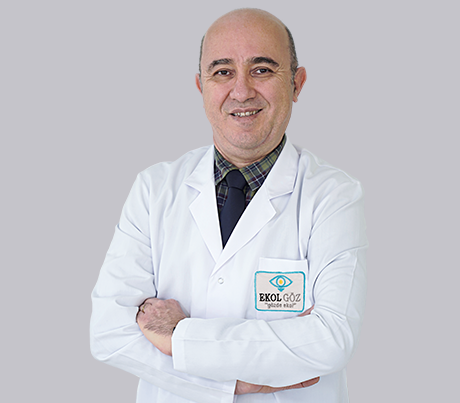 He graduated from Ege University Faculty of Medicine in 1989. Specialization he completed his education in Izmir Education and Research between 1991-1994. He completed his Ophthalmology Department at the Hospital. International A large number of scientific articles included in scientific indexes have been published. Numerous oral and poster presentations to national and international scientific meetings has a presentation. He is an active member of the Turkish Ophthalmology Association (TOD). Fluent in English, Opr. Dr. Gazi Duman is married and has two children. Special interests: Cataract Surgery (multifocal, trifocal, toric intraocular lenses) Cataract Surgery with Laser (Femtosecond Laser Cataract) Excimer Laser Surgery (Lasik, Lasek, PRK) Medical and Surgical Retina Eyelid Surgery Strabismus Surgery
He graduated from Ege University Faculty of Medicine in 1989. Specialization he completed his education in Izmir Education and Research between 1991-1994. He completed his Ophthalmology Department at the Hospital. International A large number of scientific articles included in scientific indexes have been published. Numerous oral and poster presentations to national and international scientific meetings has a presentation. He is an active member of the Turkish Ophthalmology Association (TOD). Fluent in English, Opr. Dr. Gazi Duman is married and has two children. Special interests: Cataract Surgery (multifocal, trifocal, toric intraocular lenses) Cataract Surgery with Laser (Femtosecond Laser Cataract) Excimer Laser Surgery (Lasik, Lasek, PRK) Medical and Surgical Retina Eyelid Surgery Strabismus Surgery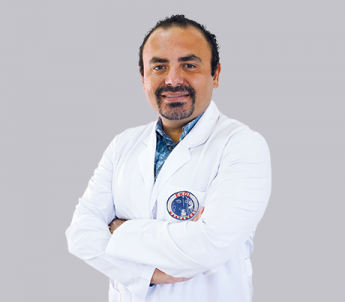 He graduated from Dokuz September University Faculty of Medicine in 2005. September 2005-2010, he completed his specialty education in the Department of Ophthalmology of the Faculty of Medicine of Dokuz Eylül University and earned the title of ophthalmologist. Dec.
He has published a large number of scientific articles that have entered international scientific indexes. There are many oral and poster presentations to national and international scientific meetings. He is an active member of the Turkish Ophthalmology Association (TOD), the American Academy of Ophthalmology Association and the European Society of Cataract and Refractive Surgeons. He won the European Ophthalmology Qualification Exam (European Board of Ophthalmology) and became a FEBO.
Opr, who is married and has 1 child. Dr. Hüseyin Aslankara speaks English well.
Special interests:
Retinal Diseases and Vitreoretinal Surgery
Cataract Surgery (multifocal, trifocal, toric intraocular lenses)
Cataract Surgery with Laser (Femtosecond Laser Cataract)
Excimer Laser Surgeries (Lasik, Lasek, PRK)
Strabismus Treatment and Surgery
Children's Eye Diseases
Eye Pressure (Glaucoma) Treatment and Operations
Retinopathy of Prematurity and Its Treatment
Eyelid Surgeries
He graduated from Dokuz September University Faculty of Medicine in 2005. September 2005-2010, he completed his specialty education in the Department of Ophthalmology of the Faculty of Medicine of Dokuz Eylül University and earned the title of ophthalmologist. Dec.
He has published a large number of scientific articles that have entered international scientific indexes. There are many oral and poster presentations to national and international scientific meetings. He is an active member of the Turkish Ophthalmology Association (TOD), the American Academy of Ophthalmology Association and the European Society of Cataract and Refractive Surgeons. He won the European Ophthalmology Qualification Exam (European Board of Ophthalmology) and became a FEBO.
Opr, who is married and has 1 child. Dr. Hüseyin Aslankara speaks English well.
Special interests:
Retinal Diseases and Vitreoretinal Surgery
Cataract Surgery (multifocal, trifocal, toric intraocular lenses)
Cataract Surgery with Laser (Femtosecond Laser Cataract)
Excimer Laser Surgeries (Lasik, Lasek, PRK)
Strabismus Treatment and Surgery
Children's Eye Diseases
Eye Pressure (Glaucoma) Treatment and Operations
Retinopathy of Prematurity and Its Treatment
Eyelid Surgeries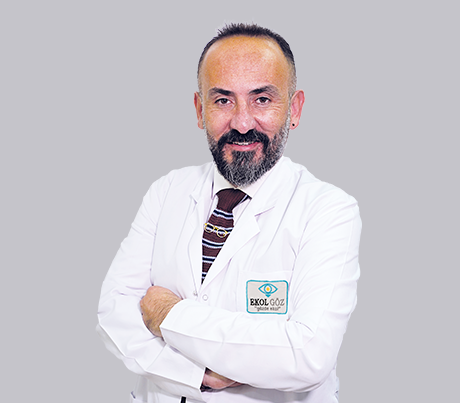 He was born in Nevşehir in 1977. He graduated from Ege University Faculty of Medicine in 2000. He completed his specialization education at Celal Bayar University Faculty of Medicine, Department of Ophthalmology between 2000-2004 and earned the title of ophthalmologist. He is the owner of the Turkish Ophthalmology Board Certificate, which was first given in 2003.
A large number of scientific articles that entered international scientific indexes have been published. There are many oral and poster presentations to national and international scientific meetings. He is an active member of the Turkish Ophthalmology Association (TOD). Between 2007 and 2008, Ophthalmology Manual for General Practitioners, Brucellosis in the Etiology of Uveitis and A.O.O.O. There are book translations in Wound Healing Chapters.
Op. Dr. Mustafa Alper Çerçi is fluent in English.
Special interests: Cataract Surgery (multifocal, trifocal, toric intraocular lenses) Cataract Surgery with Laser (Femtosecond Laser Cataract) Excimer Laser Surgery (Lasik, Lasek, PRK) Medical Retina Eyelid Surgery Strabismus Glaucoma
He was born in Nevşehir in 1977. He graduated from Ege University Faculty of Medicine in 2000. He completed his specialization education at Celal Bayar University Faculty of Medicine, Department of Ophthalmology between 2000-2004 and earned the title of ophthalmologist. He is the owner of the Turkish Ophthalmology Board Certificate, which was first given in 2003.
A large number of scientific articles that entered international scientific indexes have been published. There are many oral and poster presentations to national and international scientific meetings. He is an active member of the Turkish Ophthalmology Association (TOD). Between 2007 and 2008, Ophthalmology Manual for General Practitioners, Brucellosis in the Etiology of Uveitis and A.O.O.O. There are book translations in Wound Healing Chapters.
Op. Dr. Mustafa Alper Çerçi is fluent in English.
Special interests: Cataract Surgery (multifocal, trifocal, toric intraocular lenses) Cataract Surgery with Laser (Femtosecond Laser Cataract) Excimer Laser Surgery (Lasik, Lasek, PRK) Medical Retina Eyelid Surgery Strabismus Glaucoma